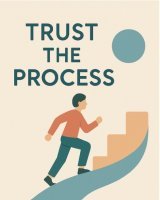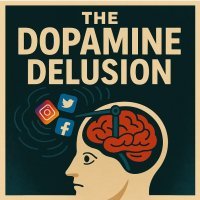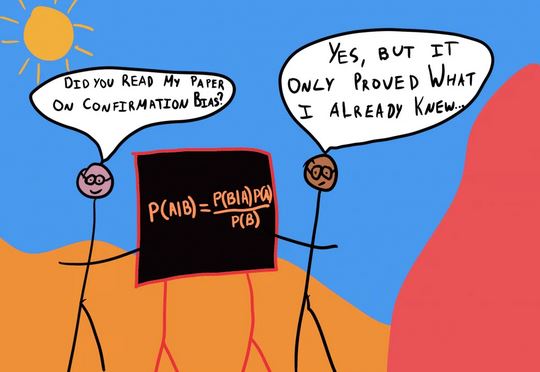Confirmation Bias
Seeing What You Want To See
Selecting and acting upon information that confirms your existing beliefs
Confirmation Bias - Overview
Confirmation bias occurs when you:
- Select and act upon information that confirms your existing beliefs, prejudices, preferences or hypotheses
- Give more weight to evidence that supports your beliefs and diminishes the evidence that disproves it
- Recall information selectively
- Interpret information with a preferential bias
Confirmation bias tends to be stronger with emotionally charged issues and where you hold deeply entrenched beliefs.
Why does it happen?
Our brains use shortcuts, which are known as heuristics,
Confirmation bias is a heuristic used when you collect, analyse and interpret information.
Because the process of evaluating evidence takes time and energy, your brain automatically looks
for such shortcuts to speed up the process and make more efficient use of your mental resources.
It has been suggested by evolutionary scientists that our use of these shortcuts is based on survival instincts.
In the modern world this is less to do with survival and more to do with convenience. Processing and assessing information quickly, and formulating new explanations, hypothesis and beliefs takes time. You are therefore more likely to follow the patterns that the human brain has adapted over the last 100,000 years, largely out of necessity, to take the path of least resistance, .
A further reason why you may exercise confirmation bias is to do with self esteem.
It can be very threatening to your identity and sense of self to discover that your deeply held views are disproved by the evidence you are assessing. To face evidence that a long held and deeply felt belief is inaccurate or false can be the motivating influence for use of this bias.
As a consequence of this you may look for information that supports rather than disproves your existing beliefs.
Confirmation
bias is most likely to affect you when you are at the information gathering stage prior to making a decision.
Like most of the demons and gremlins that drive so much of our behaviour, and distort our judgement, confirmation bias occurs unconsciously.
This means that you are most likely unaware of its influence on your decision making thought processes.
As with most unconscious thought processes, if we knew we had them and could see them at work, we would not act upon them.
Therefore, it follows that the first step to avoiding confirmation bias is [a] being aware that it is a problem, and [b] understanding that it is unconscious.
Avoidance Step 1.
- Start with a neutral and objective fact base by having at least one - and preferably several - third party who inputs at the information gathering stage.
As a personal illustration of this, when I am researching people and subjects for inclusion on this website, I will also search for the contra-view by using negative search phrases and/or searching for reviews and criticisms of the person or subject in view.
Avoidance Step 2.
- In group situations, when you are at the data review analysis and interpretation stage, encourage those with differing opinions to speak.
- If however you have allowed [or inherited] a culture of compliancy to be created and you are surrounded by "yes men/women", or if you are unfortunate enough to work in such a culture, hire external assistance to provide the wider and counter views.
The best people to use for this are senior interim managers or similar third parties who have extensive experience of your sector.
Alternatively, seek the input and opinion of independent minded natural leaders who are in the frontline of your organisaion and who are part of the informal organisation - that is, they are not part of the official management structure.
Further Reading:
Excellent and comprehensive article from Shane Parrish of Farnam St:
Confirmation Bias And the Power of Disconfirming Evidence
Earning The Right To Hold An Opinion
Any fool can sound off and reject a belief system or a differing perspective, but the minimum requirement for an authentic rejection is a basic comprehension of the strengths as well as the weaknesses of that which is being rejected.
Unless you have held a belief and have developed a considerable comprehension of it you are not in a position of sufficient knowledge to reject it.
Further Reading:
Another excellent article from Shane Parrish of Farnham Street:
The Work Required To Hold An Opinion
Further Reading:
Why You Should Embrace Anomalies – The Value Of Disconfirming Evidence
Understanding Complex Systems Thinking - It's Not Complicated
Return from "Confirmation Bias" to: Cognitive Distortions
LATEST ARTICLES
Staying Committed When You Can't See Progress - The Psychology of Grit
 Uncertainty Is Not The Absence Of Progress, Only The Absence Of Reassurance. One of the most destabilising experiences in modern life is not failure, but uncertainty and staying committed when you can…
Uncertainty Is Not The Absence Of Progress, Only The Absence Of Reassurance. One of the most destabilising experiences in modern life is not failure, but uncertainty and staying committed when you can…The Battle For Your Mind - How To Win Inner Freedom In A Digital Age Of Distraction
 From External Events to Inner Events. We often think of “events” as things that happen out there: the traffic jam, the rude comment, the delayed email reply. But what truly shapes our experience is wh…
From External Events to Inner Events. We often think of “events” as things that happen out there: the traffic jam, the rude comment, the delayed email reply. But what truly shapes our experience is wh…How to See Your Thoughts Without Becoming the Story
 A Practical Guide to Thought-Awareness. You can spend your life inside the stories of your mind without ever learning how to see your thoughts clearly and objectively. Most of the stuff we tell oursel…
A Practical Guide to Thought-Awareness. You can spend your life inside the stories of your mind without ever learning how to see your thoughts clearly and objectively. Most of the stuff we tell oursel…The Collison Decision Matrix - A Simple Framework for Better Choices
 The Collison Decision Matrix Is A Practical Everyday Thinking Tool. Most of us spend a surprising amount of time worrying about decisions. From small ones such as what to wear, what to eat, what to te…
The Collison Decision Matrix Is A Practical Everyday Thinking Tool. Most of us spend a surprising amount of time worrying about decisions. From small ones such as what to wear, what to eat, what to te…The Power Of Asking The Right Question
 The Power Of Asking The Right Question Lies In The Quest For Insight. To experience the power of asking the right question you must develop the practice of asking questions. The best way to improve th…
The Power Of Asking The Right Question Lies In The Quest For Insight. To experience the power of asking the right question you must develop the practice of asking questions. The best way to improve th…Site Pathways
 Here is a site pathway to help new readers of Zen-Tools navigate the material on this site. Each pathway is based around one of the many key themes covered on this site and contain a 150 word introduc…
Here is a site pathway to help new readers of Zen-Tools navigate the material on this site. Each pathway is based around one of the many key themes covered on this site and contain a 150 word introduc…How To Live With Contradiction - Beyond Thought Let Stillness Speak
 A major impact on so many peoples' lives is the situational contradiction of unfilled realistic expectations. So where does all this leave us? Well here we are, with mental equipment that is more lim…
A major impact on so many peoples' lives is the situational contradiction of unfilled realistic expectations. So where does all this leave us? Well here we are, with mental equipment that is more lim…How To Trust The Process Of Mindfulness - Right Now
 In mindfulness, the process isn’t some distant goal — it's what is happening right now. When we talk about how to trust the process of mindfulness the credibility of the process is heavily dependent…
In mindfulness, the process isn’t some distant goal — it's what is happening right now. When we talk about how to trust the process of mindfulness the credibility of the process is heavily dependent…Inner Mastery For Outer Impact - Mental Clarity For Effective Action
 Insights only matter if they translate into consistent action. In a world crowded with quick fixes and motivational soundbites, the theme “Inner Mastery for Outer Impact” calls us to something more e…
Insights only matter if they translate into consistent action. In a world crowded with quick fixes and motivational soundbites, the theme “Inner Mastery for Outer Impact” calls us to something more e…The Wise Advocate - Helping You Achieve The Very Best Outcome
 The focus of your attention in critical moments of choice either builds or restricts your capacity for achieving the best outcome. When we talk of 'The Wise Advocate' its easy to think of the consigl…
The focus of your attention in critical moments of choice either builds or restricts your capacity for achieving the best outcome. When we talk of 'The Wise Advocate' its easy to think of the consigl…Trust The Process - Beyond The Cliche
 The phrase "trust the process" has become a cliche, the woo-woo mantra of the "self help" industry. Those three little words feel like they ought to mean something useful but hidden behind them are a…
The phrase "trust the process" has become a cliche, the woo-woo mantra of the "self help" industry. Those three little words feel like they ought to mean something useful but hidden behind them are a…The Dopamine Delusion - Why Anticipation Beats Achievement
 The thrill we feel is not in the having, but in the wanting. The more we have, the more we want. The more things we acquire and the easier things get for us, the more discontent we feel. The more spo…
The thrill we feel is not in the having, but in the wanting. The more we have, the more we want. The more things we acquire and the easier things get for us, the more discontent we feel. The more spo…
